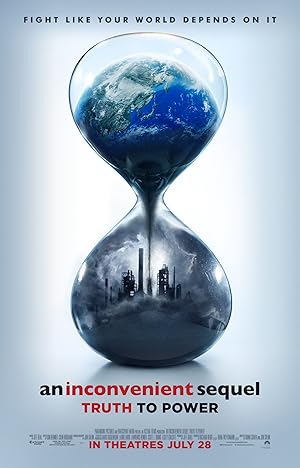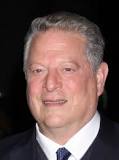
An Inconvenient Sequel: Truth to Power
1
Al Gore's movie
An Inconvenient Truth
won him an Oscar, and yet,
much of the movie is nonsense.
"Sea levels may rise 20 feet"
is absurd!
But this is Al Gore.
He always goes down the road
of hyperbole.
Not only is he losing
the argument
on climate change,
but he's losing the science
as well.
You don't go
see Joseph Goebbels' films
to see the truth
about Nazi Germany.
You don't want
to go see Al Gore's film
to see the truth
about global warming.
And it's the most severe
winter storm in years,
which would seem to contradict
Al Gore's hysterical
global warming theories.
Donald Trump says
he's had it up to here
with Al Gore
and is calling for the
Nobel Peace Prize committee
to take the prize away.
Yes or no, do you believe
that human-caused global warming
is a moral,
ethical, and spiritual issue
affecting our survival?
Yes, I do.
Yes or no,
do you believe that reducing
fossil fuel-based energy usage
will lead to lower
greenhouse gas emissions?
Basically, yes.
I don't think we...
That's... That's good.
Senator Gore...
If I could just, uh, continue...
Well, you can't.
Now, it seems
that everything is blamed
on global warming.
Last summer, we had a
heat wave, and everyone said,
"Oh, that's proof
it's global warming."
Then we had a mild December.
"Oh, that's proof"
"it's global warming
that's taking place."
Now, I wonder how come you guys
never seem to notice it
when it gets cold?
The National Academy of Sciences
here in this country
and in the 16
largest or most-developed
countries in the world
agrees with the consensus
that I've stated.
Senator Gore, my time
is almost expired completely.
Are you aware of that?
It seems that everybody...
I would like to respond.
May I respond?
...global warming in
the media joined the chorus...
Excuse me, Senator Imhofe.
How can you ask a question
and not give the man
a minute to answer?
Please.
Senator, thank you. Um...
I've been sitting here
trying to think
what I could do or say
that, uh...
That might make it possible
to reach out to you.
And I'm serious about this.
I'd love to, um,
talk with you
without the cameras
and without the lights and...
And tell you, uh,
why I feel so strongly
about this.
And we've got to call the other,
I think, three or four speakers
for the Generation Client
Conference, too.
All right, so now back to
the Paris conference.
I'd like a briefing on
the must-do meetings in Paris.
And I'll circle back
to Christiana
well before then
on how I can best help her.
I need to talk to
Secretary Kerry
- about the long-term goal.
- Mmm-hmm.
I want to schedule
the China climate training
during the first three months
of the year.
to lock that down.
Yeah, definitely.
Morning. Morning.
Thank you for your help.
Since An Inconvenient Truth
came out ten years ago,
climate-related
extreme weather events
have gotten so much worse.
And so I've continued
to give my slideshow
all around the world.
Now, I want to add
the latest images
of the flooding going on
right now in Louisiana.
Okay, I think both of those'll
fit really well there.
I mean, every week now
this stuff
just keeps getting worse
and more of it.
But...
Actually, there were times when
it really looked bleak and dark
because the forces trying
to stop the change regrouped
and poured tons of money
in trying to paralyze
the political system
in the U.S.
and in other countries.
I got really discouraged.
And there came a time for me
when I felt, wow, we could
lose this struggle.
We need to recruit more people.
Thank you. Thank you so much.
Thank you. Thank you.
I hope you're having
a productive
and enjoyable, wonderful time
at this training session.
I've been doing this
a long time.
And I was reminded recently
of how long it's been
since I started this.
I was sitting in a restaurant.
A woman came walking by
in front of my table,
just staring at me.
And I didn't think
anything of it until,
a few moments later,
I saw the same woman
coming from
the opposite direction,
just staring at me.
So I looked up and I said,
"How do you do?"
And she took one step forward
and she said,
"You know,
if you dyed your hair black,"
"you would look
just like Al Gore."
And so I said, "Thank you."
And she said,
"You sound like him, too."
But anyway...
One of the comedians on TV
said recently,
"The way you know
global warming is real"
"is if the hottest year ever"
"is the year
you're currently in."
Fourteen of the 15
hottest years ever measured
have been since 2001.
The hottest of all was 2016.
This graph shows
average temperatures
from 1951 through 1980.
The white are the normal days,
the blue are
the cooler-than-average days,
and the red are
warmer-than-average days.
And in the 1980s,
the entire curve
shifted to the warm side.
And we saw, for the first time,
the appearance of
a statistically significant
number of extremely
hot days in the lower right.
In the 1990s,
the curve shifted further.
And in the last ten years,
the extremely hot days
have become more numerous
than the
cooler-than-average days.
We still have cool days.
We still have cold days.
But these extremely hot days
are becoming much more numerous.
In April of this year,
the temperature over Greenland
was much higher than normal.
An engineer on one of
the helicopters took a video
during this temperature spike.
Those are parts of the glacier
just exploding
with the high temperatures.
Hey, Eric. How you doing?
Good to see you again.
So, you see the line
on the ridge here?
Yes.
That grey line is
where the ice surface was
back in the '80s.
- Not so long ago.
- Not long ago at all.
It's amazing to think
that just 30 years ago,
where we are right now,
it was all covered
by the big ice sheet.
- You ready for me?
- Yeah.
Yeah, I'll hold the ladder.
- Thank you, Bianca.
- Yeah, no problem, Al.
Welcome to Swiss Camp!
We have 20
automatic weather stations
measuring the climate.
Swiss Camp is just one of them.
This is the cumulative
height change of melt.
Yes. I see.
Since 2000 to now,
we lost 12 meters
- of ice at that elevation.
- Wow.
That was our former station,
level with the surface.
- Yes.
- Very deep pillars.
We came back next season.
That's where we are now.
This is okay here?
- Around there?
- Yes. Yeah.
That would be a hole you don't
- want to step in, right?
- Yes.
So, it's going
straight down there?
So the water rushes down.
And since it's heavier than ice,
it pushes its way
underneath the ice sheet.
And we can measure
how the ice is lifted up
a few millimeters
to a centimeter.
And then the ice moves fast
and you reduce the friction.
And, in effect, the ice sheet
starts speeding up
in its flow toward the ocean.
That's correct.
So this makes the ice mass
like Swiss cheese.
It is frustrating that
for many years,
I've tried to communicate
Translation
Translate and read this script in other languages:
Select another language:
- - Select -
- 简体中文 (Chinese - Simplified)
- 繁體中文 (Chinese - Traditional)
- Español (Spanish)
- Esperanto (Esperanto)
- 日本語 (Japanese)
- Português (Portuguese)
- Deutsch (German)
- العربية (Arabic)
- Français (French)
- Русский (Russian)
- ಕನ್ನಡ (Kannada)
- 한국어 (Korean)
- עברית (Hebrew)
- Gaeilge (Irish)
- Українська (Ukrainian)
- اردو (Urdu)
- Magyar (Hungarian)
- मानक हिन्दी (Hindi)
- Indonesia (Indonesian)
- Italiano (Italian)
- தமிழ் (Tamil)
- Türkçe (Turkish)
- తెలుగు (Telugu)
- ภาษาไทย (Thai)
- Tiếng Việt (Vietnamese)
- Čeština (Czech)
- Polski (Polish)
- Bahasa Indonesia (Indonesian)
- Românește (Romanian)
- Nederlands (Dutch)
- Ελληνικά (Greek)
- Latinum (Latin)
- Svenska (Swedish)
- Dansk (Danish)
- Suomi (Finnish)
- فارسی (Persian)
- ייִדיש (Yiddish)
- հայերեն (Armenian)
- Norsk (Norwegian)
- English (English)
Citation
Use the citation below to add this screenplay to your bibliography:
Style:MLAChicagoAPA
"An Inconvenient Sequel: Truth to Power" Scripts.com. STANDS4 LLC, 2025. Web. 20 Feb. 2025. <https://www.scripts.com/script/an_inconvenient_sequel:_truth_to_power_2786>.







Discuss this script with the community:
Report Comment
We're doing our best to make sure our content is useful, accurate and safe.
If by any chance you spot an inappropriate comment while navigating through our website please use this form to let us know, and we'll take care of it shortly.
Attachment
You need to be logged in to favorite.
Log In